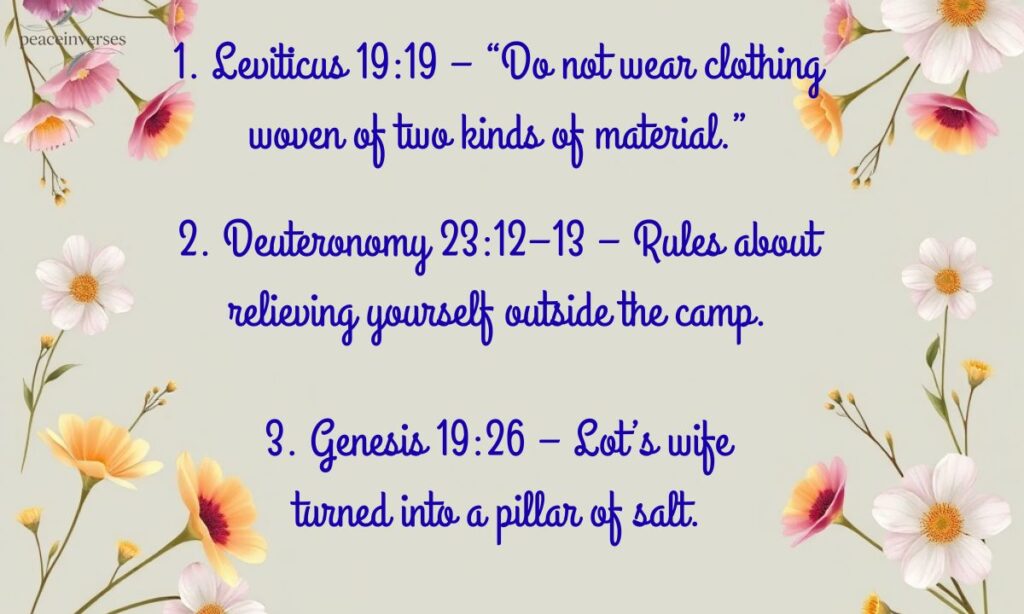Ever stumbled on a Bible verse that made you stop and say, “Wait, what?!” Some passages sound so unusual or even funny that they leave you scratching your head. These verses may look odd on the surface, but many have deeper meaning once you know the context.
In this list of the 25 stupidest Bible quotes, we’ll break down the verses that seem confusing, shocking, or just plain weird at first glance. Don’t worry—we’ll also look at the context behind them, so you can see why they’re in the Bible and what they actually mean.
What Makes a Bible Verse Sound “Stupid” Today?
Sometimes a Bible verse sounds strange because we hear it with modern ears. Words that were once clear can feel confusing today. Culture and language have changed over centuries. What feels odd now often made perfect sense back then.
Lost in Translation or Lost in Time?
Many verses sound funny or awkward because of translation gaps. Ancient Hebrew, Greek, and Aramaic had words with multiple meanings. When shifted into English, the phrases can feel clumsy.
- Some words had no direct English match.
- Certain idioms turned into literal phrases.
- Cultural references didn’t survive the shift.
That’s why a verse may read oddly, but its original meaning was sharp and clear.
Misinterpretation and Context Collapse
A verse can seem “stupid” when we pull it out of context. Without knowing who wrote it, why, and for whom, it loses depth. Readers sometimes twist it into something it never meant.
Think of it like quoting half a sentence. The missing part changes everything. Many of these so-called “weird” verses make sense when read in full. Context is not optional—it’s essential.
Modern Humor vs Ancient Text
What we find funny today may not have been funny at all in ancient times. Humor changes with culture. A verse that sounds silly now may have carried deep seriousness back then.
At the same time, some passages really do sound wild when compared to modern thinking. That doesn’t make the Bible weak. It just shows the distance between ancient worldview and ours. Understanding that gap helps us read with respect and clarity.
25 Stupidest Bible Quotes (And Why They Sound That Way)

Some verses in the Bible sound strange, funny, or even shocking when we read them today. But often, what feels “stupid” at first glance makes sense once we see the context. Here are 25 examples explained with clarity and reflection.
1. Leviticus 19:19 – “Do not wear clothing woven of two kinds of material.”
- Verse: A ban on mixed fabrics.
- Context: Symbolic laws teaching Israel about separation and holiness.
- Reflection: Strange now, but then it reminded people of their unique identity.
2. Proverbs 21:9 – “Better to live on a corner of the roof than share a house with a quarrelsome wife.”
- Verse: A man prefers the rooftop.
- Context: Wisdom literature often used humor and exaggeration.
- Reflection: Not an insult, but a reminder of the value of peace at home.
3. Deuteronomy 23:12–13 – Rules about relieving yourself outside the camp.
- Verse: Commands about sanitation.
- Context: Israel lived in tents while traveling; hygiene was critical.
- Reflection: Funny to us, but it shows God cared about health and order.
4. Ecclesiastes 1:2 – “Meaningless! Meaningless! Everything is meaningless.”
- Verse: Life sounds hopeless.
- Context: Solomon wrestled with life apart from God.
- Reflection: At first depressing, but it teaches us to find true purpose.
5. Matthew 5:29 – “If your right eye causes you to sin, gouge it out.”
- Verse: Jesus speaks of self-mutilation.
- Context: A hyperbole about sin’s seriousness.
- Reflection: Out of context, violent. In truth, it stresses spiritual discipline.
6. Genesis 19:26 – Lot’s wife turned into a pillar of salt.
- Verse: A woman becomes salt.
- Context: Symbolic punishment for disobedience.
- Reflection: Odd today, but it warned against looking back at sin.
7. Leviticus 11:10 – “Anything living in the water that does not have fins and scales is detestable.”
- Verse: Shellfish banned.
- Context: Dietary laws separated Israel from neighbors.
- Reflection: Now it feels extreme, but it reinforced cultural holiness.
8. Judges 15:16 – Samson kills 1,000 men with a donkey’s jawbone.
- Verse: A jawbone as a weapon.
- Context: Samson’s story is full of symbolic feats.
- Reflection: Unrealistic by today’s standards, but it showed God’s power through him.
9. Ezekiel 4:12 – “Eat the food as you would a loaf of barley bread; bake it in the sight of the people, using human excrement for fuel.”
- Verse: Cook food over dung.
- Context: A prophetic act symbolizing Israel’s exile.
- Reflection: Disgusting to us, but it carried a powerful warning.
10. Deuteronomy 25:11–12 – A law about a woman grabbing a man’s private parts in a fight.
- Verse: A shocking penalty.
- Context: Ancient rules protected honor and lineage.
- Reflection: It sounds brutal now, but it reflects ancient social order.
11. Exodus 22:18 – “Do not allow a sorceress to live.”
- Verse: Death for sorcery.
- Context: In ancient Israel, sorcery was tied to idol worship.
- Reflection: Harsh today, but it guarded spiritual purity.
12. Leviticus 20:9 – “Anyone who curses their father or mother is to be put to death.”
- Verse: Death for dishonor.
- Context: Honor of parents was central in Israelite law.
- Reflection: Extreme to us, but it underscored family respect.
13. Genesis 32:24–25 – Jacob wrestles with God all night.
- Verse: Wrestling with God.
- Context: Symbolic of Jacob’s struggle for blessing.
- Reflection: Odd picture, but it shows faith through struggle.
14. Numbers 22:28 – Balaam’s donkey talks.
- Verse: A talking animal.
- Context: A miracle used to warn Balaam.
- Reflection: It reads like a fairy tale, but it highlights God’s power over creation.
15. Leviticus 15:19 – Laws about women during menstruation.
- Verse: Women considered unclean.
- Context: Ritual purity laws were cultural.
- Reflection: Feels offensive now, but it pointed to spiritual cleanliness.
16. Deuteronomy 14:21 – “Do not cook a young goat in its mother’s milk.”
- Verse: Strange cooking law.
- Context: Likely banned pagan rituals.
- Reflection: Seems silly, but it set Israel apart from pagan practices.
17. 2 Kings 2:23–24 – Bears maul boys for mocking Elisha.
- Verse: Children attacked by bears.
- Context: Mocking God’s prophet was serious.
- Reflection: Harsh reading, but it highlights respect for God’s authority.
18. Genesis 6:4 – “The Nephilim were on the earth in those days.”
- Verse: Mysterious giants.
- Context: A cryptic reference to fallen beings.
- Reflection: Confusing to us, but it shows the mystery of ancient times.
19. Matthew 21:19 – Jesus curses a fig tree.
- Verse: A tree dies.
- Context: Symbol of Israel’s fruitlessness.
- Reflection: Odd act, but it’s a lesson about faith and fruitfulness.
20. Jonah 1:17 – Jonah swallowed by a big fish.
- Verse: Man in a fish.
- Context: A miracle to teach Jonah repentance.
- Reflection: Feels impossible, but it shows God’s mercy and power.
21. Genesis 19:8 – Lot offers his daughters to a mob.
- Verse: Shocking offer.
- Context: Hospitality was sacred in that culture.
- Reflection: Horrible to us, but it shows the brokenness of humanity.
22. Numbers 31:17–18 – Harsh war instructions.
- Verse: Orders to kill and spare selectively.
- Context: Ancient warfare was brutal and tribal.
- Reflection: Disturbing today, but it reflects ancient realities.
23. Judges 11:30–31 – Jephthah vows to sacrifice the first thing from his house.
- Verse: A rash vow.
- Context: Shows the danger of foolish promises.
- Reflection: Strange story, but it teaches wisdom in speech.
24. Song of Solomon 4:2 – “Your teeth are like a flock of sheep.”
- Verse: Teeth compared to sheep.
- Context: Ancient poetry used pastoral imagery.
- Reflection: Funny now, but it was romantic back then.
25. Revelation 9:7–10 – Locusts with human faces and lion teeth.
- Verse: Bizarre creatures.
- Context: Apocalyptic visions full of symbolism.
- Reflection: Sounds absurd, but it represents chaos and judgment.
Why These Verses Are Still Important to Study
At first glance, these verses may seem confusing, harsh, or even funny. But they challenge us to dig deeper. They remind us that the Bible was written in a different time and culture. Studying them helps us grow in wisdom, humility, and understanding.
- They show the gap between ancient culture and modern life, helping us see how much has changed.
- They push us to study context, history, and language, not just isolated words.
- They remind us that God’s message is layered, and deeper truths often sit behind unusual verses.
- They help us confront uncomfortable passages with honesty instead of avoidance.
- They invite us to see the Bible as a living text, still relevant even when parts feel strange.
Conclusion
The so-called “stupidest Bible verses” are not as foolish as they seem. When we take time to read their context and purpose, they become windows into faith, culture, and human history. Some verses challenge us, some make us laugh, and some make us uncomfortable. But each one has something to teach. Instead of dismissing them, we can let them shape our perspective, humility, and respect for God’s Word.

Muhammad Shoaib is a passionate faith-based writer with over 10 years of experience in creating meaningful content centered around prayers, Bible meanings, scriptural teachings, and heartfelt wishes. He is the lead writer at PeaceInVerses.com, where he shares spiritual insights and uplifting messages to guide and inspire readers on their faith journey.

